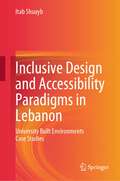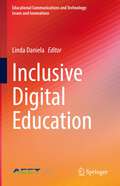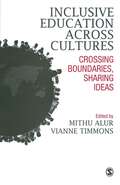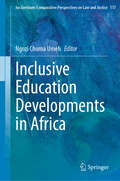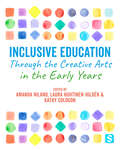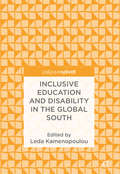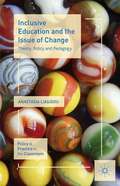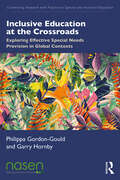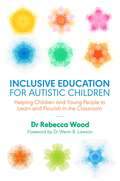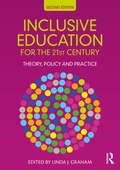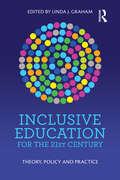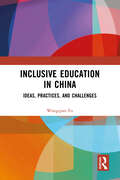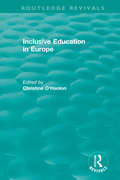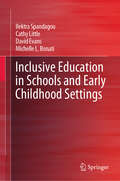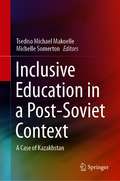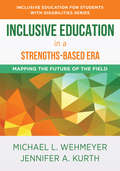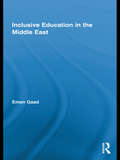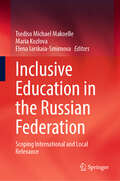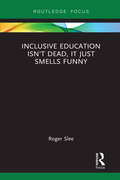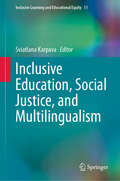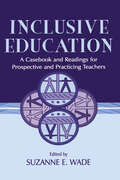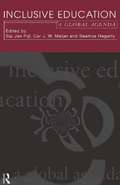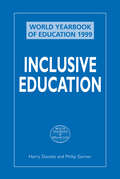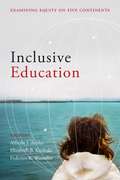- Table View
- List View
Inclusive Design and Accessibility Paradigms in Lebanon: University Built Environments Case Studies
by Itab ShuaybThis book describes the disability rights movement that started in the USA and its influence on the disability rights movement in Lebanon, which has led to the endorsement of the Lebanese Disability Act 220/2000. The book introduces the reader to the Lebanese Disability Act 220/ 2000, its definition of disability, and its relation to the medical and social models of disabilities and then articulate the Act articles. Then, it defines the inclusive design paradigm that acknowledges the needs of all people at each stage of their life cycle and presents the difference between inclusive design and accessibility and disability notions. Moreover, the book reviews the different international accessible design standards (American and French) that are adopted in Lebanon with the absence of a nationalized Lebanese design standard and its effect on eliminating barriers and enhancing accessibility at university buildings. Besides, the book presents students' experiences and their satisfaction with the university built environments. 6 university buildings case studies at the American University of Beirut are assessed and analysed to check whether they adopt the inclusive design approach and then propose inclusive design solutions for both heritage and modern university buildings. What makes the book unique is its combination of empirical and theoretical application of inclusive design. The last section, reflects the author’s inclusive design teaching pedagogy. In this section, the author shares samples of students’ class design project and provides recommendations and guidelines for teaching inclusive design so it becomes mainstream.
Inclusive Digital Education (Educational Communications and Technology: Issues and Innovations)
by Linda DanielaThis book is about the promotion and development of digital solutions for inclusive education, including a variety of hardware, software, digital learning materials, and digital learning content currently available on the market. All of these technological solutions serve as support materials and building blocks for inclusive learning environments but, at the same time, can involve hidden risks which may inadvertently create even greater gaps in inclusive education. This book provides strategies and methodologies that promote the development of opportunities for using digital technologies to support inclusive education. It provides an, understanding how to close the current digital gap while ensuring that the digital technologies selected do not support new risks of exclusion from the digital learning environment, strengthening and augmenting the already existing digital divide.
Inclusive Education Across Cultures: Crossing Boundaries, Sharing Ideas
by Mithu Alur Vianne TimmonsThis comprehensive collection provides a global perspective on inclusive education. The existing literature delves into whether inclusive practice is about educating children with disabilities or children from diverse backgrounds. The articles in this compilation assert that it is both. Inclusive Education Across Cultures: Crossing Boundaries, Sharing Ideas brings together multiple perspectives to present a compelling case for inclusive practice in different areas of inclusive education, ranging from policy initiatives to practices on the ground level, and advocating and creating awareness. The articles present examples that are explicitly disability-focussed and at the same time present a vision of inclusion that is about societal reform. These articles provide a voice to the people living with disabilities and enable us to learn from their stories. They not only provide theoretical information, but also connect theory and practice by discussing implemented models and practical resources. This work will be a valuable resource material for all those involved in the study of education, social work and psychology.
Inclusive Education Developments in Africa (Ius Gentium: Comparative Perspectives on Law and Justice #117)
by Ngozi Chuma UmehThis book contributes to the discourse on disability in Africa as an issue of systemic exclusion characterized by the discrimination and often complete segregation of persons with disabilities (PWDs) in various African countries. Despite the inclusive promise of the Convention on the Rights of Persons with Disabilities (CRPD) as well as the Protocol to the African Charter on Human and Peoples’ Rights on the Rights of Persons with Disabilities in Africa, the situation has not actually improved for PWDs in Africa. Given the powerful evidence of the devaluation of PWDs in connection with the COVID-19 pandemic, it is high time to reflect on the experiences of persons with disabilities in education, along with other forms of discrimination they encounter. The book’s respective chapters assess how well the existing legal frameworks, policies and practices in most African countries have met the needs for inclusion of children and adults with disabilities. The social and economic rights of persons with disabilities are protected in the constitutions of most countries and enshrined in the normative frameworks that most African leaders have adopted and ratified. These commitments need to be borne in mind when thinking about the present and the future. Inclusive development is an investment and must be viewed as part of a package of reforms that are connected to substantive social protection and improvements in realizing other socio-economic goods. Indeed, a range of alliances are needed to advance the goals of ‘leaving no one behind’, ensuring ‘education for all’, and delivering on the African Union’s call for the development of policies, programmes and requisite budgets for the realization of inclusive education for persons with disabilities.
Inclusive Education Through the Creative Arts in the Early Years
by Laura Huhtinen-Hildén Amanda Niland Kathy CologonThis book offers an engaging exploration of artistic expression in early childhood education. Through a blend of theory, research, and practical insights, the authors demonstrate the positive impact of the arts on fostering inclusion in various settings. Delving into creative modes such as dance, drama, and music, the book emphasizes the broader significance of integrating creativity into inclusive practices. Rich with illustrative case studies, thought-provoking prompts, and effective strategies for encouraging artistic expression, it serves as a valuable resource for early childhood students seeking comprehensive support in their educational journey.
Inclusive Education Through the Creative Arts in the Early Years
by Laura Huhtinen-Hildén Amanda Niland Kathy CologonThis book offers an engaging exploration of artistic expression in early childhood education. Through a blend of theory, research, and practical insights, the authors demonstrate the positive impact of the arts on fostering inclusion in various settings. Delving into creative modes such as dance, drama, and music, the book emphasizes the broader significance of integrating creativity into inclusive practices. Rich with illustrative case studies, thought-provoking prompts, and effective strategies for encouraging artistic expression, it serves as a valuable resource for early childhood students seeking comprehensive support in their educational journey.
Inclusive Education and Disability in the Global South
by Leda KamenopoulouThis edited volume examines inclusive education and disability in the global South. Presenting four qualitative research studies conducted in Malaysia, Bhutan, Philippines and Belize, the authors examine the implementation of inclusive education and disabled children’s participation in the education system: contexts on which very little is known. Thus, this book provides a unique opportunity to access rare context-specific information concerning this region of the world; and to reflect on the particular challenges some countries face in the realization of full participation of all children within education. Authored by researchers who are also teaching professionals with experience and understanding of the complexities of the real world, this book reminds us that researchers and policy makers must listen to all voices and perspectives: especially those that have remained silenced and ignored.
Inclusive Education and the Issue of Change
by Anastasia LiasidouThis book critically examines transformative change within the context of inclusive education policy and practice. Exploring the theoretical, policy and classroom (pedagogical) dimensions of the process of transformative change, this book documents the ways in which ideological presuppositions and professional practice should be transformed in order to meet learner diversity in effective and non-discriminatory ways. The distinctiveness of the book lies in its analytical approach, which aimsto blend diverse perspectives and disciplinary lenses to provide a comprehensive understanding of the ways in which transformative changes aligned with the tenets of an inclusive discourse can be theorized and enacted. The sheer complexity and interdependency of the perspectives underpinning the process of change, necessitates adopting a multiperspectival and multidisciplinary approach to theorizing educational change.
Inclusive Education at the Crossroads: Exploring Effective Special Needs Provision in Global Contexts (Connecting Research with Practice in Special and Inclusive Education)
by Garry Hornby Philippa Gordon-GouldInclusive Education at the Crossroads explores the short and long-term effectiveness of government plans to reform policy for special needs education, confronting difficult questions on policies about inclusion and suggesting alternative ways forward for achieving more effective education of children with special educational needs and disabilities (SEND).Inclusion has been a central concern for education systems globally for over three decades. However, has preoccupation with inclusion been at the expense of effective education for children with SEND? Where do policies for inclusion lead, and do they amount to the special education reform that is needed? What do the worldwide experiences of inclusion and special education reveal about how to improve the quality of education systems for all children in the future? How effective is the provision for children with SEND today? Through this informative and topical book, Gordon-Gould and Hornby shine an interrogating spotlight on current provision for SEND and ask if current legislation and policy inadvertently reinforce problems; if they cause many children with SEND to fall short of their potential, as well as preventing many schools from improving their levels of overall academic attainment. Inclusive Education at the Crossroads provides theory and research for teachers, school leaders, governors, policy makers, researchers, parents, post graduate students and anyone seeking practical solutions to meeting the needs of pupils with SEND in any global context. It will encourage open debate about the essence of educational inclusion in order to stimulate creative thinking among all stakeholders.
Inclusive Education for Autistic Children: Helping Children and Young People to Learn and Flourish in the Classroom
by Rebecca WoodThis book presents original, empirical research that reframes how educators should consider autism and educational inclusion. Rebecca Wood carefully unpicks common misapprehensions about autism and how autistic children learn, and reconsiders what inclusion can and should mean for autistic learners in school settings. Drawing on research and interwoven with comments from autistic child and adult contributors throughout, the book argues that inclusion will only work if the ways in which autistic children think, learn, communicate and exhibit their understanding are valued and supported. Such an approach will benefit both the learner and the whole classroom. Considering topics such as the sensory environment, support, learning and cognition, school curriculums, communication and socialisation, this much needed book offers ideas and insight that reflect the practical side of day-to-day teaching and learning, and shows how thinking differently about autism and inclusion will equip teachers to effectively improve teaching conditions for the whole school.
Inclusive Education for the 21st Century: Theory, Policy and Practice
by Linda J. GrahamThoroughly revised throughout, this bestselling book returns in a new edition to take an even more comprehensive look at the question: How can teachers and schools create genuinely inclusive classrooms that meet the needs of every student? Inclusive Education for the 21st Century provides a rigorous overview of the foundational principles of inclusive education and the barriers to access and participation. It explores evidence-based strategies to support diverse learners, including specific changes in curriculum, pedagogy and assessment practices, and the use of data. It addresses the needs of children with physical, sensory and intellectual disabilities, as well as those with complex learning profiles, including mental health issues. This second edition is rich with new content, including eleven new chapters which address learning from international experience, multi-tiered systems of support, leading inclusive education reform, the importance of language and supporting friendships. A new section has been added to provide explicit support for implementing systemic inclusive education reform from the policy level right through to classroom practice. A new series of podcasts, featuring interviews with expert chapter authors, offers an engaging complement to the chapter topics and content. With many schools still operating under twentieth-century models that disadvantage students, this book presents the deep knowledge, tools and strategies to better equip pre- and in-service teachers and leaders to make inclusive education a reality in all schools.
Inclusive Education for the 21st Century: Theory, policy and practice
by Linda J. GrahamPlacing a student on the autism spectrum in a busy classroom with a pair of noise-cancelling headphones and an aide to deal with the inevitable meltdowns is often done in the name of 'inclusion', but this is integration and not inclusive. How can teachers and schools create genuinely inclusive classrooms that meet the needs of every student?Research evidence indicates the strategies that make schools inclusive for students with disability benefit all students. Yet many schools are still operating under twentieth-century models that disadvantage students, especially those with disability. Inclusive Education for the 21st Century provides a rigorous overview of the foundational principles of inclusive education, and the barriers to access and participation. It explores evidence-based strategies to support diverse learners, including specific changes in curriculum, pedagogy and assessment practices, and the use of data. It addresses the needs of children with physical, sensory and intellectual disabilities, as well as those with complex learning profiles, including mental health issues.With chapters from leading experts from Australia and the UK, Inclusive Education for the 21st Century addresses common issues in both primary and secondary schools. Underpinned throughout by research evidence, it is designed to assist educators to develop the deep knowledge required to make inclusive education a reality in all schools.
Inclusive Education in China: Ideas, Practices, and Challenges
by Wangqian FuBy adopting a comparative approach, this book investigates the philosophy, policy, practices, and challenges of inclusive education in the Chinese contexts, recognizing influences of Chinese culture, such as Confucianism, collectivism, and familism. In the 1980s, the Chinese government promoted a policy named “Learning in Regular Classroom” to ensure educational rights for children with disabilities, which subsequently turned into an inclusive education program in the western sense. Starting from this point, the policy and practice of inclusive education have developed tremendously. To facilitate reflection and future development, this is the latest and most comprehensive attempt at understanding the status quo of inclusive education in China from a variety of perspectives: from early childhood to higher education, from family to schools and communities, from peers to teachers and parents. It also analyzed the unique Chinese philosophy of inclusive education, adding to current debates with a Chinese lens. This book will appeal to academics, students, and practitioners in disciplines such as education, early childhood studies, sociology, social work, social policy, disability studies, and youth studies.
Inclusive Education in Europe (Routledge Revivals)
by Christine O'HanlonOriginally published in 1995, this book offers a crucial view of the implementation of legislation for the integration of pupils with special educational needs in EU countries at the time. The match or mismatch between the rhetoric and reality, between the policy and the practice are reviewed by presenters from a recent appraisal of progress in individual national contexts. Authors are critical of the situation in their own countries and call upon recent and relevant research sources to support their views. The relationships between particular themes in the education of pupils with special needs are observed and compared in a broad European context.
Inclusive Education in Schools and Early Childhood Settings
by David Evans Ilektra Spandagou Cathy Little Michelle L. BonatiThis book provides a highly informative yet concise overview of special education and inclusive education that serves as a valuable introduction to the field. Using a framework and relevant scenarios in inclusive educational settings to help readers develop a basic understanding of key concepts, it shares effective practices and engages readers in discussions on current research. Further, it highlights the commonalities between different levels of education and explores transitions across them. The book addresses theory, policy, practice and research issues in special education and inclusive education from an Australian perspective, focusing on current developments in Australian educational settings and classrooms. It also examines international issues and developments while highlighting the unique characteristics of the Australian educational context. As such, it appeals to post-graduate students, pre-service teachers, teachers and other professionals in the area.
Inclusive Education in a Post-Soviet Context: A Case of Kazakhstan
by Tsediso Michael Makoelle Michelle SomertonThis book provides the first evidence-based reference about inclusive education in Kazakhstan, one of the post-Soviet Union countries. This nation, as well as many other central Asian countries, is undergoing a radical transformation and change in education which encompasses the implementation of inclusive and special education. This book is composed of chapters synthesized from various studies and captures different aspects of the implementation of inclusive education in Kazakhstan.The implementations of inclusive education in any educational system require a multi-dimensional, multi-level and an integrated approach. It requires collaborative efforts on part of all stakeholders including governance, pedagogical, auxiliary and support structures. This book is a collection of evidence-based studies in a Kazakhstani educational context that demonstrates the multifaceted nature of the process to realize an educational system that is inclusive. The book highlights some of the fundamental requirements and challenges for this process to succeed.Among the main issues addressed in this book are the understanding of inclusive education, the transition towards inclusive education given the soviet legacy, the role of school leadership, teachers, parents and other stakeholders in the process. The findings in each chapter demonstrate some of the milestones and challenges of inclusivity. This work will be of interest to academics, scholars, students and teachers in this field.
Inclusive Education in a Strengths-Based Era: Mapping the Future of the Field (Inclusive Education for Students with Disabilities #0)
by Michael L. Wehmeyer Jennifer KurthIt’s time to focus on what students can do, rather than what they can’t. In this inaugural book in their Inclusive Education for Students with Disabilities series, Michael L. Wehmeyer and Jennifer A. Kurth explore central, defining questions for the field of special and inclusive education: who, what, and where do we teach; what works in inclusive education; and where does inclusive education go now? Arguing that the concept of disability for the past fifty years has emphasized students as incapable and incompetent, the authors propose instead to build on a growing understanding that students with disabilities can be successful and meet high expectations, and that educators have the knowledge and skills to achieve this. From this strength-based perspective, the presumption is that disability is part of, and not apart from, typical human functioning. Using this lens, Wehmeyer and Kurth describe effective practices to guide instruction in inclusive settings—practices that begin with a consideration of each student’s strengths and capacities, rather than with a diagnosis.
Inclusive Education in the Middle East (Routledge Research in Education)
by Eman GaadThe potential of adopting inclusive education to support learning for all is an international phenomenon that is finding its way to the Middle East and the Arabian region. Eman Gaad examines the current status of inclusive education in Arabia and the Middle East through an assessment of the latest international, regional, and local research into inclusive education. With a focus on the more complex areas of related cultural practice and attitudes towards inclusive education in this dynamic and fast-changing part of the world, Gaad offers a research-based analysis of the current educational status of the Arabian Gulf and some Middle Eastern countries that adopted inclusive practice in education, and others that are yet to follow. This book will be of great interest to students, academics, teachers, and therapists in the field of comparative and inclusive education as well as those with an interest in policies of education in the dynamic and culturally distinguished Middle Eastern Arabian region.
Inclusive Education in the Russian Federation: Scoping International and Local Relevance
by Elena Iarskaia-Smirnova Tsediso Michael Makoelle Maria KozlovaMarketing text: This book provides the first evidence-based accounts of inclusive education in a Russian context. It explores the critical educational changes in the Russian Federation within the post-soviet space and internationally. The book analyzes the transformation of educational practices as Russia transitions from an educational model of student support with an emphasis on disability to a broader conceptualization of inclusive education. Among others, this book discusses inclusive education in the context of: • School and preschool institutions; • higher education institutions; • non-Russian-speaking children and children with migration experience; • culture-sensitive education; • indigenous minorities; • technological and methodological support; • the role of stakeholders such as NGOs, parents, and other social groups; • teacher preparation and professional development. This book is intended for teachers, inclusive education coordinators, principals and school managers, policymakers, teacher educators, scholars of inclusion, and university professors, along with community organizations and students of inclusive courses in a Master in Education.
Inclusive Education isn't Dead, it Just Smells Funny
by Roger SleePositing inclusive education as a cornerstone of democracy, social equality and effective education, this unique book offers a timely response to the recent conservative backlash which has dismissed inclusive education as a field of research and practice which has become outdated and unfit for purpose. With profound insight and clarity, Slee delves deep into the architecture of modern-day schooling to show how inclusive education has been misappropriated and subverted, manifesting itself in a culture of ableism, an ethic of competitive individualism and the illusion of special educational needs. A unique book in both form and content, the author draws on music and art theory, on real-life observations and global experience, contemporary education policy and practice to reject calls for a return to segregated schooling, and put forward a compelling counterargument for schooling which models the kind of world we want our children to live in – a world of authentic, rather than divided communities. A timely response to a modern-day debate with global relevance, Inclusive Education isn’t Dead, it Just Smells Funny will be of interest to researchers and educators, policy makers, parents and practitioners with an interest in inclusive education.
Inclusive Education, Social Justice, and Multilingualism (Inclusive Learning and Educational Equity #11)
by Sviatlana KarpavaThis edited volume delves into the intricate relationships between multilingualism, inclusive education, and social justice. It presents a rich array of interdisciplinary studies that blend both theoretical and practical perspectives. The authors employ a mixed-methods approach to gather and analyze data from a diverse range of populations, including students, teachers, parents, and language policy experts across various educational levels. The book examines the dynamics of bilingual and multilingual classrooms, as well as Content and Language Integrated Learning (CLIL) environments, emphasizing the importance of linguistic and cultural diversity as valuable educational resources. It draws upon a variety of theoretical and practical approaches from applied linguistics, sociolinguistics, language policy, and education, all centered on the benefits of multilingualism, inclusive education, and social justice. The work explores the complexities of multilingualism and multiculturalism and their connections to inclusive education and social justice across different geographic regions and educational settings. It adopts a dual approach, examining both theoretical frameworks and practical realities, by incorporating the voices and perspectives of multiple stakeholders. This diverse range of viewpoints sheds light on the roles of family and school involvement in promoting multilingual education, inclusive practices, and social justice.
Inclusive Education: A Casebook and Readings for Prospective and Practicing Teachers
by Suzanne E. WadeInclusive Education includes two sections: readings and cases. The readings present approaches for creating inclusive classrooms and schools; their purpose is to give prospective and practicing teachers background information in curricular, instructional, assessment, and collaborative problem-solving strategies that foster inclusive education. The Casebook consists of "An Introduction to Cases" and 14 teaching cases based on actual events as experienced by the case authors that describe in rich detail the experiences of parents, students, and teachers related to inclusive education. Most of the cases pose problems or dilemmas to be resolved--including the struggles of parents seeking inclusive education for their children; students' attempts to succeed in general education classrooms; special educators', principals' and teachers' experiences as they collaborate in moving toward inclusive programs; and teachers' concerns for the future success of their students.
Inclusive Education: A Global Agenda (International Perspective On Reading Assessment Ser. #8)
by Seamus Hegarty Cor and Meijer Sip Jan PijlThe way in which special education is conceived varies around the world, and pratice varies accordingly. One of the current debates concerns the concepts of mainstreaming, integration and inclusion - and whether these are in fact different concepts, or simply differnt terminology. This book is based on the assumption that inclusive education is a necessary part of providing high quality education for all. Using international examples, it clarifies the rationale for inclusion and demonstrates how it can be put into practice.
Inclusive Education: Aspects Of Good Practice For Gypsy Traveller Pupils (Research Report Ser. #Vol. 238)
by Harry Daniels Philip GarnerThis volume provides overviews and approaches to inclusive education from around the world. It defines the philosophical, political, educational and social implications of "inclusion", and maps out the dilemmas facing its successful implementation.
Inclusive Education: Examining Equity On Five Continents
by Alfredo J. Artiles Elizabeth B. Kozleski Federico R. WaitollerIntroduction: equity in inclusive education / Elizabeth B. Kozleski, Alfredo J. Artiles, and Federico R. Waitoller -- pt. 1. Equity issues in first-generation inclusive education. Equity and inclusive education in Austria: a comparative analysis / Mikael Luciak and Gottfried Biewer ; Inclusive education and the interlocking of ability and race in the United States: notes for an educational equity research program / Elizabeth B. Kozleski, Alfredo J. Artiles, Federico R. Waitoller, and Christopher L. Lukinbeal ; Inclusion, place, and disadvantage in the English education system / Alan Dyson, Lisa Jones, and Kirstin Kerr ; Equity for immigrant students in German schools? / Jessica M. Löser and Rolf Werning ; Challenges and responses to inclusive education in Sweden: mapping issues of equity, participation, and democratic values / Girma Berhanu ; Ability construction, deficit thinking, and the creation of an inclusion gap for students of color in the United States: views from suburban schools / Roey Ahram and Edward Fergus -- pt. 2. Equity issues in second-generation inclusive education. Equity in inclusive education in South Africa / Petra Engelbrecht ; Inclusive education in India: the struggle for quality in consonance with equity / Nidhi Singal and Roger Jeffery ; From equity to difference: educational legal frames and inclusive practices in Argentina / Carlos Skliar and Inés Dussel ; Challenges to inclusive education in Kenya: postcolonial perspectives and family narratives / Kagendo Mutua and Beth Blue Swadener ; Conclusion: global norming / Ray McDermott, Brian Edgar, and Beth Scarloss.
